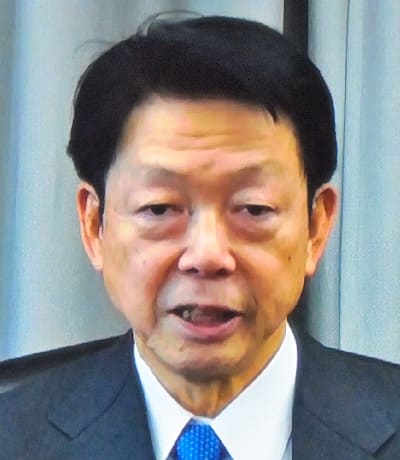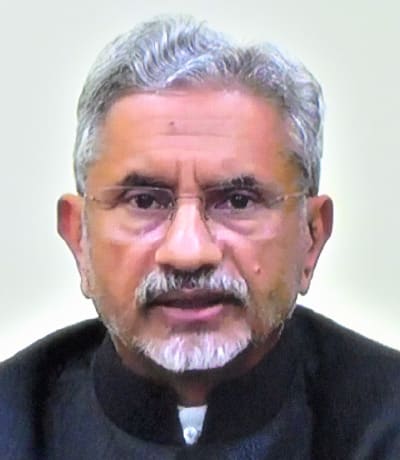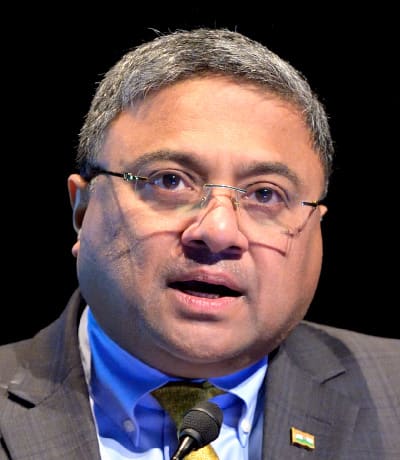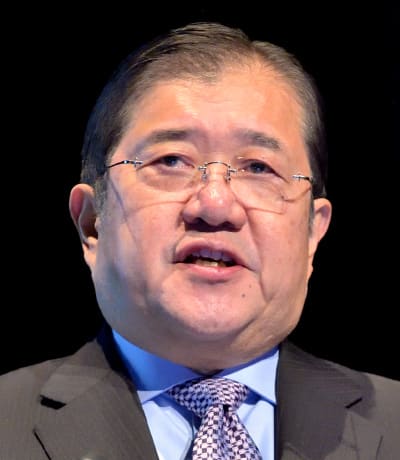Kicking off the forum were opening remarks from five speakers: Japan’s Minister of Economy, Trade and Industry Yoji Muto, India’s External Affairs Minister Subrahmanyam Jaishankar, India’s Ambassador to Japan Sibi George, Mitsui & Co.’s Chair of the Board of Directors and the Japan-India Business Co-operation Committee’s Chairman Tatsuo Yasunaga, and the African Development Bank’s Senior Vice President Marie-Laure Akin-Olugbade.
The Japan-India Cooperation Initiative for Sustainable Economic Development in Africa
Yoji Muto, Minister of Economy, Trade and Industry—Japan

Muto began with comments on Japanese and Indian cooperation in international frameworks, such as the Quadrilateral Security Dialogue (Quad) grouping of Australia, India, Japan, and the United States, and on the 10th anniversary in 2025 of Japan and India’s Special Strategic Global Partnership. Muto then invited attention to the Free and Open Indo-Pacific vision that Japan advanced in 2023. Advancing that concept has centered, he acknowledged, on Asian nations. But he insisted that extending it westward from India as a “free and fair economic zone” that will include Africa is an urgent task.
“We will launch the Japan-India Cooperation Initiative for Sustainable Economic Development in Africa,” Muto revealed. Japan’s Ministry of Economy, Trade and Industry (METI) is positioning that initiative as a measure for promoting investment by Japanese companies in India and establishing business platforms that will invigorate bilateral business with African nations.
METI has announced plans for promoting cooperation in that spirit among the public and private sectors of Japan, India, and Africa. That activity will be oriented toward fostering inclusive and sustainable economic growth. It will feature a focus on enhancing the industrial clustering of Japanese companies in India, as well as expanding investment, job creation, and human resources development in Africa.
Capacity building, skills development,
and technology transfer
Subrahmanyam Jaishankar, External Affairs Minister—India

Jaishankar lauded the forum as a platform for highlighting “the deep and shared commitment of India and Japan to strengthening our engagement bilaterally and collaborating to promote development and economic growth in Africa and beyond.” He noted that Japan and India have the shared values of democracy, freedom, and rule of law and a common vision for a free and open Indo-Pacific. The nation’s bilateral relations, he added, have evolved into a strategic and global partnership. “Together, we have built strong foundations in areas such as infrastructure, technology, healthcare, and education.”
The Global South, Jaishankar reminded his audience, is emerging as a driver of global economic growth. And he emphasized the importance of ensuring that “its aspirations and interests are fully represented on the global stage.” Jaishankar stressed that India has championed that cause consistently through such platforms as the G20, the Voice of Global South Summits, the India-Africa Forum Summits, and the Forum for India–Pacific Islands Cooperation. He noted that the African Union became a full member of the G20 during India’s G20 presidency, which extended from December 2022 to November 2023.
“India believes in capacity building, skills development, and technology transfer [to help] African countries develop self-sustaining growth ecosystems,” Jaishankar summarized. And he offered several examples of concrete initiatives for fulfilling that stance.
1,500 success stories
Sibi George, Ambassador to Japan—India

“In India today, we have 1,500 Japanese companies,” declared George. “These are 1,500 success stories. These companies work in India, grow in India, and build our relationship. I have a target to increase this number from 1,500 to 15,000 . . . Japan is not just a partner, but a pivotal collaborator.”
George expressed pride in India and Japan’s bilateral relationship. And he reiterated Jaishankar’s observation that their relationship has evolved into a Special Strategic and Global Partnership. The ambassador cited some important aspects of the Indian vitality that attracts Japanese companies. And he discussed how that vitality underlies Indian and Japanese engagement with Africa.
“India has distinguished itself as one of the fastest-growing large economies in the world today, with a median age of 28 years. And among our 1.4 billion citizens, our young, skilled workforce is a foundation for innovation and for entrepreneurship. We are proud of our status as the world’s fifth-largest economy and third largest startup ecosystem, with 112 unicorns [startups valued at more than US$1 billion] valued collectively at US$350 billion.
“Our development partnership with Africa,” stressed the ambassador, “is responsive to the needs of the African countries and their people. It is demand driven, free of conditions, with no political motive.”
The need for accommodating local culture and business practices
Tatsuo Yasunaga, Chair of the Board of Directors, Mitsui & Co., Chairman, Japan-India Business Co-operation Committee

“India and Africa,” declared Yasunaga, “are regions that will play pivotal roles in the world economy.” He noted that India is expected to provide a demographic bonus that will positively influence productivity levels in the country until the 2050s and that Africa is destined for medium- to long-term growth as African nations tap their abundant natural resources and explore new technologies.
Yasunaga noted that India and Japan have strengthened ties across various sectors, including diplomacy, security, economy, and culture. This deepening of ties has taken place under the Special Strategic Global Partnership initiative between the two nations. He also highlighted a shared “affinity” in their approach to fostering economic development in Africa.
“Japanese companies have contributed to advancing the Indian government’s ‘Make in India’ initiative and will continue to support the ‘Export from India’ initiative. By fostering organic connections across the Asia-to-Africa axis around the Indian Ocean and Pacific Ocean, and by promoting cooperation and development among the nations there, we can achieve sustainable growth for all.”
Yasunaga called for stepped-up integration between Japan and India for initiatives that foster the growth potential of Africa. He noted that Mitsui had appointed an Indian executive to head its operations in India. Yasunaga observed that localizing management is crucial in accommodating local culture and business practices.
Gratitude for Japanese and Indian assistance
Marie-Laure Akin-Olugbade, Senior Vice President, African Development Bank

“I want to thank Japan,” exclaimed Akin-Olugbade, “for its unwavering commitment to Africa’s development.” She had opened her remarks with an account of two recent events where Japanese public- and private-sector representatives had made good on that commitment: the Third Japan-Africa Public-Private Economic Forum, which took place in December 2024 in Abidjan, Côte d’Ivoire, and the African Development Bank’s Africa Investment Forum 2024, which took place a few days earlier in Rabat, Morocco. Akin-Olugbade cited as a result of those gatherings the signing of a memorandum of understanding between the African Development Bank and the Japanese government’s Nippon Export and Investment Insurance (NEXI).
Japan, Akin-Olugbade added, is a leading contributor to the bank’s Africa Development Fund, which extends assistance to 37 low-income nations in Africa. She also mentioned Japan’s US$5 billion contribution over the three years to 2025 to the bank’s Enhanced Private Sector Assistance for Africa initiative, which funds advances in electricity, connectivity, health, and agriculture and nutrition.
As for India, Akin-Olugbade thanked the Indian government for concluding a bilateral technical cooperation agreement with the African Development Bank in March 2024. She noted that 42 African nations had benefited over the past decade from US$12 billion in credit extended by the Export-Import Bank of India. And she expressed gratitude to the Indian government for helping the African Union accede to membership in the G20.






